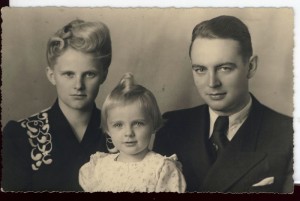Berthold Beitz has passed on at 99. A giant in business as he was a person, Beitz excelled in every aspect of his life. But he will be most fondly remembered for his acts of courage during the Nazi period when he saved the lives of Jews hiding from almost certain death at the hands of the occupying German army.
The Bank Trainee
Born the son of an army officer and bank clerk in Pomerania in 1913 (now Ciemino, Poland), his main childhood memory from almost one-hundred years ago was his parents teaching him to respect and appreciate others. Berthold wanted to study medicine, but instead he chose to join the local bank as a trainee.
The young man soon left the rural-backwaters of Pomerania to move to Hamburg where he joined the German branch of Royal Dutch Shell. Then Germany invaded Poland – the Second World War had begun.
In 1941, Beitz was appointed commercial executive of Carparthian Oil in Boryslav, Galicia, then part of the Nazi’s General Government for the Occupied Polish Territories under German rule. The systematic killing of Jews began the same year. Beitz became witness to the barbarity – and immediately acted against it. Later he said: “I did not think about it. I simply had to do it.” Berthold Beitz saved hundreds of Jews’ lives by declaring them indispensable for oil production for the German Reich. He often intervened when the situation appeared hopeless; his firm and demanding manner even intimidating SS officers. Asked many decades later whether he felt fear at the time, Beitz claimed: “Had I been afraid, I would never have succeeded.”
By Berthold’s side was Else, his wife, his confidante and his aide, whom he had married in 1939. Jewish children often came knocking at their door at night seeking shelter. Well aware of the risks to her and her family, Else took them in and hid them. Else was 20 years old at the time.
Accomplished Manager
1953: The industrialist Alfred Krupp, who had been sentenced by the Allies for crimes against humanity but released early, asked Berthold Beitz to become Chief Representative of Krupp. A synonym for Germany’s industrial power, Krupp’s image had become tainted as the “armory” of the Third Reich.
Beitz, a keen sportsman, took on the challenge. He was merely 40 years old when he took up the position. He stayed with Krupp until hisdeath, rebuilding the firm and making it internationally acceptable again. Beitz became one of the most powerful managers in post-war West Germany.
The moral obligation
Beitz never talked about the lives he saved in Boryslav – but he never forgot what he saw. And so he knew about the moral obligation to those who survived slave labor and the concentration camps. He persuaded Alfred Krupp to pay compensation to forced and slave laborers – and helped make Krupp one of the first German companies to accept responsibility and act accordingly.
Honored by Yad Vashem
Others did not forget either and they told the story of their protector. In 1973, Berthold Beitz was honored by Yad Vashem. Else Beitz was also recognized as a ‘Righteous among the Nations’ in 2006. Berthold and Else were still asking themselves whether “we could have done more.”
Berthold Beitz would have turned 100 in September this year. The industrialist and philanthropist was still working for the Krupp Foundation right up until his death. He is survived by his wife Else, their three daughters and numerous grand and great-grandchildren. Berthold Beitz was a mentsh.
Beitz never talked about the lives he saved in Boryslav – but he never forgot what he saw. And so he knew about the moral obligation to those who survived slave labor and the concentration camps. He persuaded Alfred Krupp to pay compensation to forced and slave laborers – and helped make Krupp one of the first German companies to accept responsibility and act accordingly.


